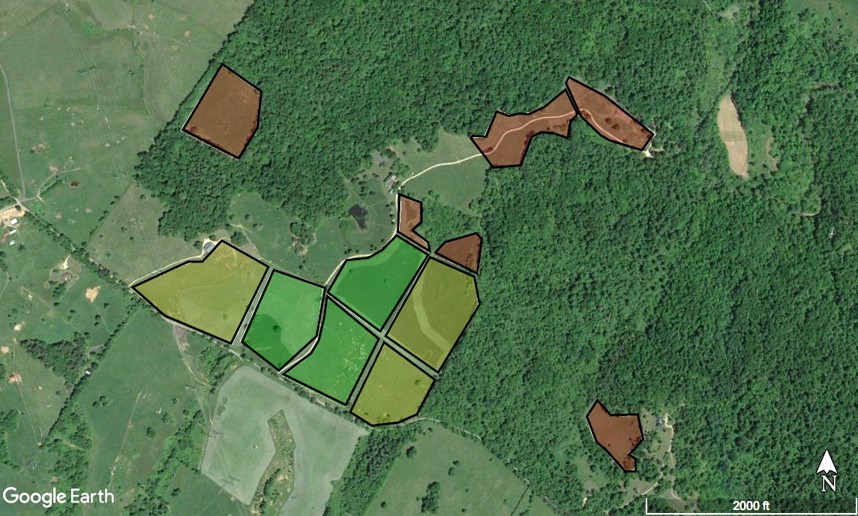

Incentives Program
| Year | Number of Farms Participating | Number of Counties Represented | Acreage Enrolled in Program | Voluntarily Participating Acreage |
| 2022 | 10 | 5 | 500 | 1300 |
| 2023 | 18 | 7 | 941 | 700 |
| 2024 | 18 | 7 | 1,527 | TBD |
| Totals | 46+ | 11+ | 2968+ | 2000+ |
The application for enrollment in VGBI’s 2024 financial incentives program is now CLOSED. Congratulation to our 2024 participating farmers – we collectively enrolled more than 1,500 acres into grassland bird conservation practices! Contingent on funding, our 2025 incentives program enrollment period will open in October 2024.
If you already participate in grassland bird-friendly land management by delaying the cutting of your hay or summer pasture stockpiling, or would like to participate without receiving financial incentives, please complete this form. We would love to learn more about your property, your experience managing your land, and grow our network of grassland bird-friendly landowners, farmers and land managers!
With funding support from the Cornell Land Trust Bird Conservation Initiative and the National Fish & Wildlife Foundation, VGBI is able to offer monetary incentive payments to farmers willing to adopt one (or both) of the following best management practices, which encourage an abundance and diversity of bird species. Birds provide important ecosystem services that directly improve the resiliency of working landscapes.
VGBI’s incentives program targets farmers interested in adopting delayed spring haying and/or summer pasture stockpiling into their long-term production goals but who might be hesitant about the financial risks involved. VGBI’s incentives program offers up to $35 per acre to offset the initial costs of piloting these best management practices.
Delayed Spring Haying
How it works: Delay the first spring cutting of hay on select fields until July 1 or later and withhold livestock, tractor/UTV activity, and other disturbances such as herbicide and fertilizer applications during this time.
Benefits: Allows producers to strategically spread out labor requirements and could lead to marketing potential to label farms and products as “bird-friendly.” Higher fiber, more mature hay is suitable for feeding dry cows, horses, and retired animals, as well as for mushroom hay and bedding. The land stays eligible for agricultural land use tax deferral.
Summer Pasture Stockpiling
How it works: Rotate cattle off select fields by April 15 and withhold livestock, tractor/UTV activity, mowing, and other disturbances such as herbicide and fertilizer applications until July 1 or later.
Benefits: Bridges the summer dormancy gap by providing standing forage in late summer without the risk and cost of planting summer annuals. Provides the opportunity to rest and prepare other fields for fall/winter stockpiling with the goal of reducing hay feeding days and annual feed cost.
Eligible Counties
Albemarle, Augusta, Clarke, Culpeper, Fauquier, Frederick, Greene, Loudoun, Madison, Orange, Page, Prince William, Rappahannock, Rockingham, Shenandoah, Warren
Site Selection
Most grassland bird species require wide expanses of grasses for nesting, so acreage that best mimics a large, contiguous patch of grass, distant from thick forest edges and human development, is best suited for this incentive program. Here are some habitat characteristics to consider when selecting fields and/or pastures:
- Size: 20 or more acres are preferred.
- Shape: Square or rectangle fields are preferred over long, narrow fields, fields with many twists and turns, and fields with patches of shrubs or trees throughout.
- Surroundings: Fields surrounded by other hay fields or pastures are preferred over
those bordered by forest or development.
Field Suitability
High (Green): Large (more than 20 acres), square or rectangular shape, open grasses, connected to other fields, few or no forested borders.
Medium (Yellow): Long and narrow or irregular shape, some forested borders, some connectivity with other fields. These fields may be considered if grassland birds are present.
Low (Red): Small (less than 20 acres), long and narrow or irregular shape, patches of trees within, most or all forested borders, no connectivity with other fields.

Incentives Program Steering Committee
VGBI has convened a steering committee of natural resource professionals and producers to guide the development of the incentives program, including eligibility requirements, a network of alternative hay markets, and resources and support that will help program participants sustain grassland bird conservation practices into the future.
Justin Proctor, Coordinator of the Virginia Grassland Bird Initiative, Smithsonian’s Virginia Working Landscapes
October Greenfield, Co-coordinator of the Virginia Grassland Bird Initiative, The Piedmont Environmental Council
Jacob Gilley, Mid-Atlantic Sustainable Grazing Manager, American Farmland Trust
Amy Johnson, Program Director, Virginia Working Landscapes
Mike Kane, Director of Conservation, The Piedmont Environmental Council
Tim Mize, Unit Coordinator and Extension Agent, Agriculture and Natural Resources – Animal Science, Virginia Cooperative Extension
Kevin Tate, Project Manager, Shenandoah Valley Conservation Collaborative
Matt Booher, Extension Agent, Virginia Cooperative Extension
Laura Lecker, Technical Director, Somerset County SWCD
How to Participate
Our interest application for enrollment in VGBI’s Financial Incentives Program is currently CLOSED. If you have any questions, please contact VGBI Co-Coordinator October Greenfield by email at ogreenfield@pecva.org or by phone at (540) 347-2334 x7051.
